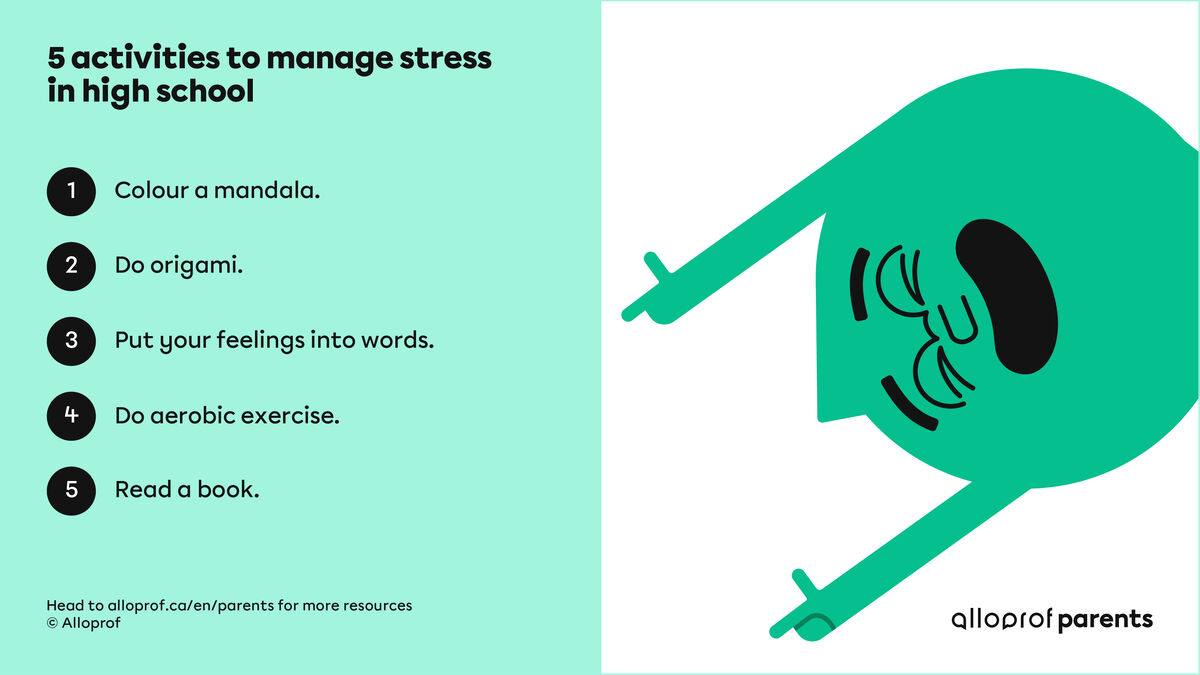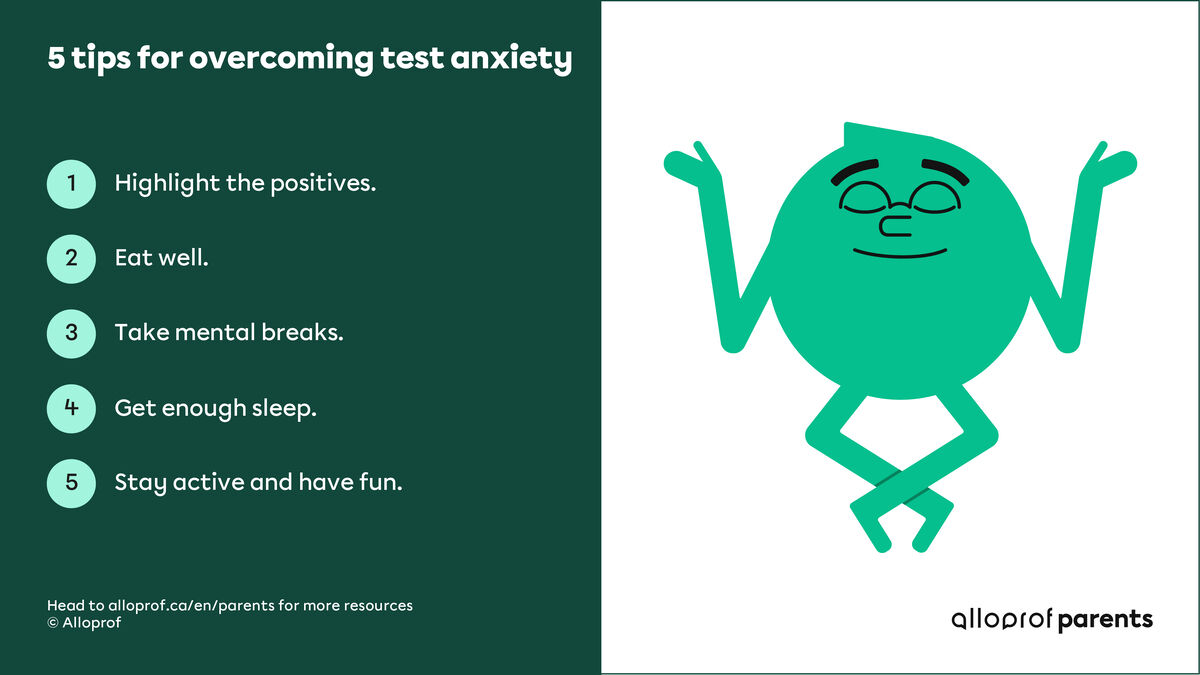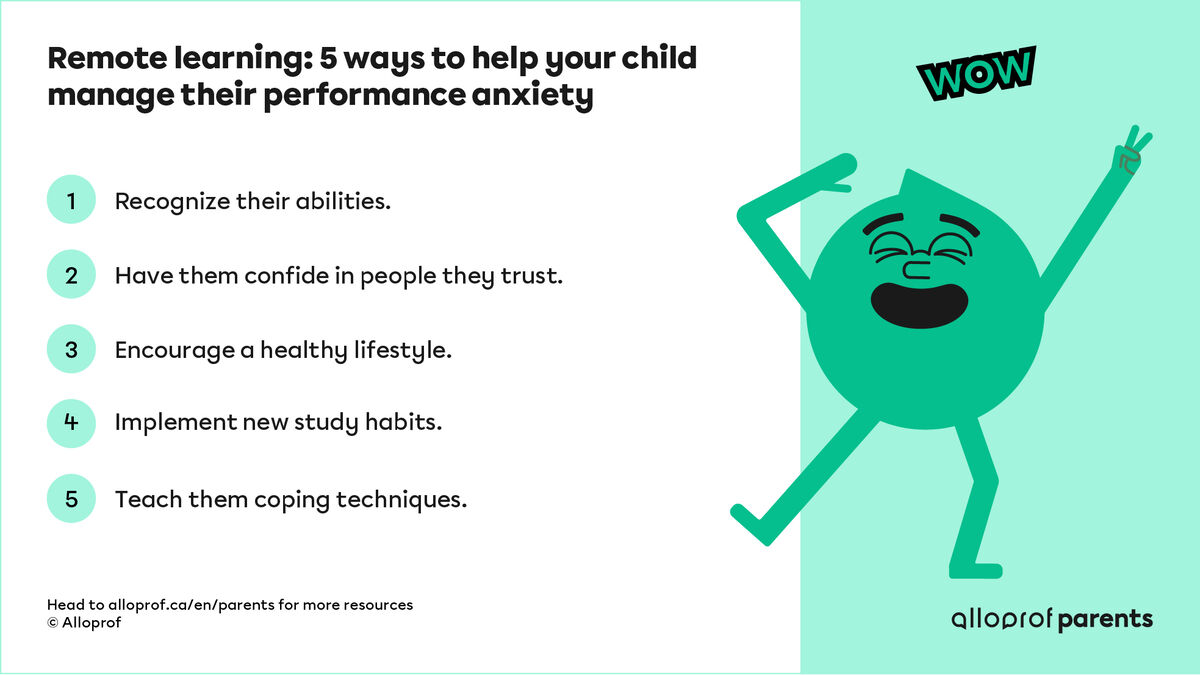Alloprof parents
Being a teenager means dealing with many sources of stress, such as exams and relationships. Just like adults, teens need strategies for handling stress. Here are five tips to share with your child.

Colour a mandala
Mandala is a Sanskrit word that means circle and represents balance. Drawing and/or colouring mandalas boosts creativity, but it’s also believed to improve concentration and lower stress and anxiety. Lots of colouring mandalas are available online, but drawing your own is even more fun. Why not have your teen make their own design?
Materials :
- Sheet of paper
- Pencil
- Marker
- Drawing compass
- Protractor
- Ruler
- Etc.
Instructions :
- Using a compass, draw several concentric circles
- Draw a horizontal line that passes through the centre of the mandala and all the circles
- Draw a vertical line that passes through the centre of the mandala and all the circles
- Using the protractor, divide each quarter into four (draw a small dot every 22.5 degrees)
- Draw a straight line between each dot and the centre of the circle
- Draw a repeating pattern (diamonds, rectangles, triangles, trapezoids, curves, etc.) in each section
- Etc.
Do origami
Origami (the art of paper folding) is a fun and relaxing activity. Focusing on folding paper into small geometrical shapes helps calm and clear the mind. It also improves dexterity—not to mention patience! There are lots of tutorials online that your teen can watch to learn how to make the following origami shapes:
Put your feelings into words
Writing is a proven stress reliever because it serves as an emotional release. Here are a few activities you can suggest that will encourage your teen to write down their thoughts:
- Keep a diary
- Write a fable inspired by a stressful situation
- Write a song
- Etc.
Do aerobic exercise
The benefits of exercise are well known: it’s good for the body and the mind. Being physically active several times a week (ideally every day) is one of the keys to leading a healthy life and reducing stress. Here are some indoor aerobic activities that you can suggest to your child:
- Go up and down the stairs a few times
- Have a dance party in the living room
- Do jumping jacks
- Do high knees on the spot
- Etc.
Read a book
Reading has the power to whisk you away from the present moment, long enough to enter the mind of a fictional character or be transported to an imaginary world. If your teen is in need of reading suggestions, we have a few French-language book lists on our website that they might enjoy. Here are a few examples:
- Funny books
- Famous figures
- Unusual French books
- Etc.
The color of homophones
The color of homophones (correction)
Collaborators
Writing : Alloprof Parents’ team
Children can start to have performance anxiety from the age of seven or eight. Here is some information about how to recognize it and help your child if they are suffering from it.

What is performance anxiety?
Being nervous before an exam is normal. When this stress becomes anxiety, it is less normal. At that point, it is intrusive and uncontrollable.
What are the symptoms of anxiety?
Performance anxiety is connected with a number of symptoms. For example:
- Stomach aches
- Nausea
- Insomnia
- Nightmares
- Irritability
- Aggression
- Agitation
How can you help an anxious child?
You can:
- Explain what performance anxiety is.
- Remind them that you love them no matter what.
- Talk about what stress is.
- Stay positive and help them rebuild their confidence in what they can do.
Your child can:
- Use a stressful situation as a challenge rather than a threat.
- Rethink how they look at a failure.
- Put a possible failure into perspective.
- Take control of a stressful situation with positive visualizations.
- Follow calming routines that will reassure them.
- Listen to music (to see things in a different light).
- Move (dance, run, go for a bicycle ride).
- Do relaxation and breathing exercises.
If these suggestions don’t help, it may be a good idea to see a professional such as a psychologist or psychoeducator. They could help your child!
In small doses, stress can be a positive force that pushes us to stay on our toes and be at our best. However, too much stress can become overwhelming and turn into anxiety. Here are a few tips to help your child overcome their anxiety during exam season.

Some people are anxious by nature, whereas others become anxious only in certain situations. Even though anxiety is often invisible to others, it’s a very real disorder that manifests itself in different ways:
- Upset stomach
- Clammy hands
- Shaking
- Sweating
- Memory blanks
- Etc.
Coping with anxious thoughts
Anxiety has a negative impact on learning because it brings up all sorts of distracting thoughts that have nothing to do with the task at hand. These thoughts can be overwhelming and prevent your child from retaining, processing, or recalling what they’ve learned. When they look at their exam sheet, their mind goes blank.
Finding the source
Some children get extremely anxious because they’re afraid they’ll run out of time or that the questions will be very difficult. However, studies have shown that test anxiety has three main causes:
- Lack of confidence (the child is convinced that they won’t do well)
- Lack of preparation (the child knows they haven’t studied enough)
- Parental expectations (the child is afraid they’ll disappoint their parents)
Did you know
Anxious children tend to blame themselves for their failures and attribute their successes to external factors. To help your child feel proud of their achievements and cope with disappointment, try to strengthen their self-esteem.
If your child is feeling anxious about an upcoming exam, it’s important to be a good listener and to highlight the positives.
- Talk about past successes
- Avoid putting pressure on them
- Acknowledge hard work in addition to good grades
- Say you’ll love them no matter what
- Remind them that mistakes and failures are learning opportunities
- Encourage them to do a fun activity to take their mind off things
- Show them relaxation exercises
- Etc.
Learning to self-soothe
To help your child conquer their anxiety and dispel memory blanks, encourage them to use their inner voice. For example, they can self-soothe by reminding themselves of the following:
- Feeling a little anxious is normal
- They’re well prepared
- They’ll remember what they studied
- They have all the answers in their brain
- A bad grade isn’t the end of the world
- Etc.
Minimizing anxiety factors
Fatigue, hunger, lack of focus, and a fear of failure can all contribute to test anxiety. Help your child adopt healthy habits to keep their stress levels at bay:
1. Eat well
If your child has a balanced diet and enjoys what they eat, they’ll find it easier to face exam days head-on. Some foods are especially good for concentration:
- Cheese
- Nuts
- Homemade muffins
- Fruit
- Etc.
If your child needs an extra boost, you can also slip encouraging notes in their lunchbox. To learn more, check out our article on what to eat before an exam.
2. Take mental breaks
After a long study session, it gets harder for the brain to process information. It’s important for your child to focus their attention somewhere else. Here are some activities they can do after an evening of studying, before they get ready for bed:
- Play a quiet game
- Read a book
- Listen to soothing music
- Etc.
3. Get enough sleep
A good night’s sleep is essential before an exam. Sleep helps your brain consolidate learning, reduces anxiety, and improves concentration, so make sure your child doesn’t pull an all-nighter!
4. Stay active and have fun
When exam season rolls around, studying is key—but so is staying active! After a study session, encourage your child to take a break. Having some fun can do wonders. Plus, exercise is a great way to reduce stress and improve concentration.
Collaborators
Writing: Marie-Claude Ouellet
Scientific review: Fany Langlais, psychoeducator
—
Rewriting: Alloprof Parents’ team
If your child was already experiencing performance anxiety in school, they’re likely to be particularly affected by the consequences of the pandemic. Luckily, there are a few ways to help them better manage their anxiety.

Recognize their abilities
Many things can cause performance anxiety—wanting to succeed at all costs, trying to maintain a high average, or taking on a personal challenge, for instance. The upheavals of the current situation cause even more stress. But you can help boost your child’s self-confidence by praising their strengths:
- Their exceptional memory
- Their impressive organization skills
- Their strong sense of responsibility
- Their perseverance,
- Etc.
Have them confide in people they trust
How will I do on my exams? What if I can’t keep up while learning from home? These are the kinds of questions that can play on loop in your child’s head and increase their performance anxiety. Talking to someone about their doubts and fears may reassure them. You can encourage them to do the following:
- Stay in touch with their teacher (by email, text, etc.)
- Contact a school staff member
- Discuss their worries with a friend
- Talk to you
- Etc.
Encourage a healthy lifestyle
Fear and fatigue can also influence how your child perceives their academic abilities. To remedy the situation, you can encourage them to adopt healthy life habits. Here are some things they could do:
- Establish a study routine
- Get a good night’s sleep
- Eat a balanced diet
- Do a relaxing activity
- Etc.
Implement new study habits
Under extraordinary circumstances, adaptation is key. To help your child adjust to learning from home and reduce their performance anxiety, you can encourage them to adopt new study habits. For example, they could do the following:
- Use their school agenda
- Make a daily to-do list
- Split up their work
- Take time to reward themselves at the end of the day
- Etc.
Teach them coping techniques
As a parent, you can have a major influence on your child’s attitude. Be positive and encourage them to try these techniques to ease their performance anxiety:
- Take deep breaths
- Keep things in perspective
- Express their emotions
- Come up with solutions
- Etc.
Did you know
By valuing hard work over results, you’ll help your child develop greater self-confidence and help reduce their performance anxiety.
Collaborators
Rewriting: Alloprof Parents’ team
Julie R -Bordeleau
Along with cooler weather, colourful leaves, and delicious harvest vegetables, September is all about change—and of course, going back to school!

Excitement and anxiety
Many children love starting a new school year. They get to see their friends, meet their new teachers, take on new challenges, and more. For them, change is exciting. They look forward to all the new things they’re going to experience.
But for some children, going back to school is deeply stressful.
Faced with this overwhelming change, they may feel frightened, anxious, or insecure. Stress caused by a new routine can affect children in different ways.
My sons react very differently to life changes, and God knows they happen quite frequently in our household since their dad works for the military.
For example, the first will cry more often than usual, the second will blow up at the smallest provocation, and the third will bully his two brothers for no apparent reason and refuse to eat certain foods.
Every child is unique and deals with stress in their own way.
How can you help your child cope during a difficult period?
There’s no miracle solution.
If there were, anxiety wouldn’t be so prevalent among adults! Having gone through several (too many!) adjustment periods caused by changes related to our military lifestyle, I’ve noticed certain things and tested out different solutions.
I’ve met some amazing people along the way who have helped me take a step back and see things more clearly. I’d like to humbly share what I’ve learned as a mother with a very hectic home life.
The adjustment period following a life change lasts about six weeks
It’s important to give ourselves time to adapt to change.
The rhythm of our lives too often reaches a frantic pace, and we forget to take a moment to breathe and readjust. Six weeks is the average amount of time it takes to adapt to a change. After experiencing it time and again, I can confirm it!
Kids are affected by other people’s emotions
After our second move, I noticed that, over time, my children’s negative reactions and outbursts weren’t due to the newness of our situation, but to their mother’s own stress and anxiety.
When you’re a parent, it can be very difficult to accept that you’re part of the problem. I decided to ask for outside help. Once we identified the issue, things quickly improved.
If Mom or Dad is going through a hard time, their kids will sense it and react. Each child has their own way of saying “I know something’s wrong and I’m upset,” which makes it difficult for us to take action. It sometimes feels like there’s nothing we can do—but in truth, it’s quite the opposite. If you’re feeling worried, overwhelmed, or at the end of your rope, it’s essential that you take a step back and dedicate time to yourself.
The biggest challenge of being a parent is having to constantly work on yourself to be a shining example for your child.
With the start of a new school year, you might feel anxious for various reasons. The most important thing is to believe in your child. Take the time to talk about their feelings, ask questions about their expectations, show your support, and stay positive (despite your own fears!) to boost their confidence during this new life step.
There’s truth to that old cliché: we are our children’s role models
As adults with years of experience, how we deal with worry sets an example for our children. If you yell, lose your temper, or burst into tears every time you’re under strain, these will probably be your child’s first reactions when they’re feeling upset, tired, stressed, or angry.
Thankfully, there are many ways to help make your day-to-day life easier during periods of high stress or anxiety. Above all, it’s important to try out different tactics to see which one works best for you.
Here are a few that we’ve tried:
- Talk: Put your feelings into words (this can be challenging).
- Press pause: Read a book (look for books that mirror your own family situation), draw, do a puzzle, play with LEGO bricks, etc.
- Use your hands: Sculpt with putty or wax, build something out of wood (supervised, of course!).
- Breathe: The heart coherence technique was a great starting point to work on our breathing, even for Mom!
- Meditate: Close your eyes and try to empty your mind. Acknowledge the thoughts that slip in, accept them, and let them go. You can find many mediation tools online.
Through trial and error, you’re sure to find an approach that works for you and your child. Good luck!



